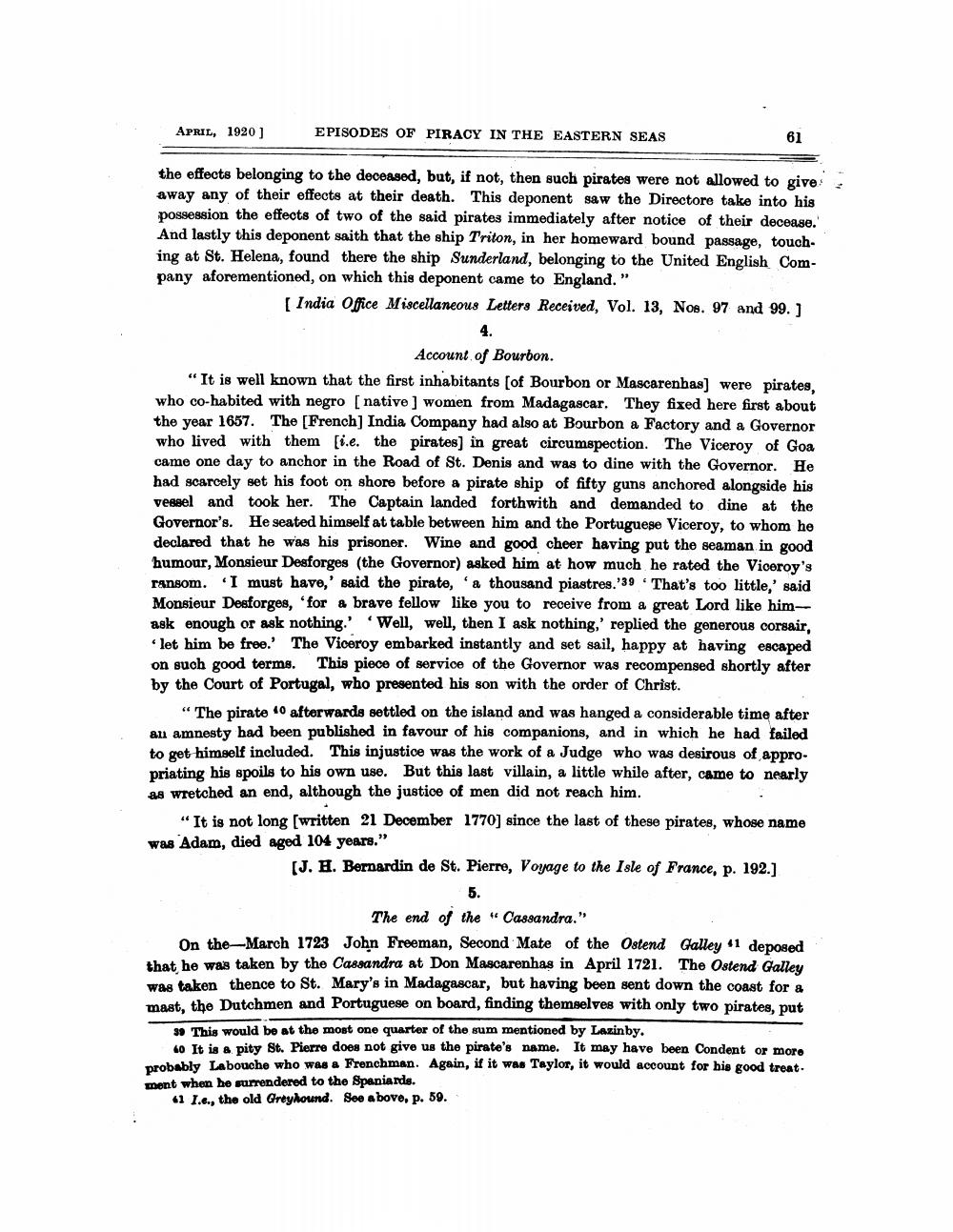________________
APRIL, 1920 ]
EPISODES OF PIRACY IN THE EASTERN SEAS
the effects belonging to the deceased, but, if not, then such pirates were not allowed to give away any of their effects at their death. This deponent saw the Directore take into his possession the effects of two of the said pirates immediately after notice of their decease. And lastly this deponent saith that the ship Triton, in her homeward bound passage, touching at St. Helena, found there the ship Sunderland, belonging to the United English Company aforementioned, on which this deponent came to England."
[ India Office Miscellaneous Letters Received, Vol. 13, Nos. 97 and 99. ]
Account of Bourbon. "It is well known that the first inhabitants (of Bourbon or Mascarenhas) were pirates, who co-habited with negro [native) women from Madagascar. They fixed here first about the year 1657. The (French) India Company had also at Bourbon a Factory and a Governor who lived with them [i.e. the pirates) in great circumspection. The Viceroy of Goa came one day to anchor in the Road of St. Denis and was to dine with the Governor. He had scarcely set his foot on shore before a pirate ship of fifty guns anchored alongside his vessel and took her. The Captain landed forthwith and demanded to dine at the Governor's. He seated himself at table between him and the Portuguese Viceroy, to whom he declared that he was his prisoner. Wine and good cheer having put the seaman in good humour, Monsieur Desforges (the Governor) asked him at how much he rated the Viceroy's ransom. I must have,' said the pirate, 'a thousand piastres.'39 That's too little,' said Monsieur Desforges, 'for a brave fellow like you to receive from a great Lord like himask enough or ask nothing.' 'Well, well, then I ask nothing,' replied the generous corsair,
let him be free.' The Viceroy embarked instantly and set sail, happy at having escaped on such good terms. This piece of service of the Governor was recompensed shortly after by the Court of Portugal, who presented his son with the order of Christ.
“The pirate 10 afterwards settled on the island and was hanged a considerable time after an amnesty had been published in favour of his companions, and in which he had failed to get himself included. This injustice was the work of a Judge who was desirous of appro. priating his spoils to his own use. But this last villain, a little while after, came to nearly as wretched an end, although the justice of men did not reach him.
"It is not long (written 21 December 1770] since the last of these pirates, whose name was Adam, died aged 104 years." (J. H. Bernardin de St. Pierre, Voyage to the Isle of France, p. 192.]
5.
The end of the “Cassandra." On the March 1723 John Freeman, Second Mate of the Ostend Galley *1 deposed that he was taken by the Cassandra at Don Mascarenhas in April 1721. The Ostend Galley was taken thence to St. Mary's in Madagascar, but having been sent down the coast for a mast, the Dutchmen and Portuguese on board, finding themselves with only two pirates, put
39 This would be at the most one quarter of the sum mentioned by Lazinby.
40 It is a pity St. Pierre does not give us the pirate's name. It may have been Condent or more probably Labouche who was a Frenchman. Again, if it was Taylor, it would account for his good treat. ment when he rurrendered to the Spaniards.
61 I..., the old Greyhound. See above, p. 59.




